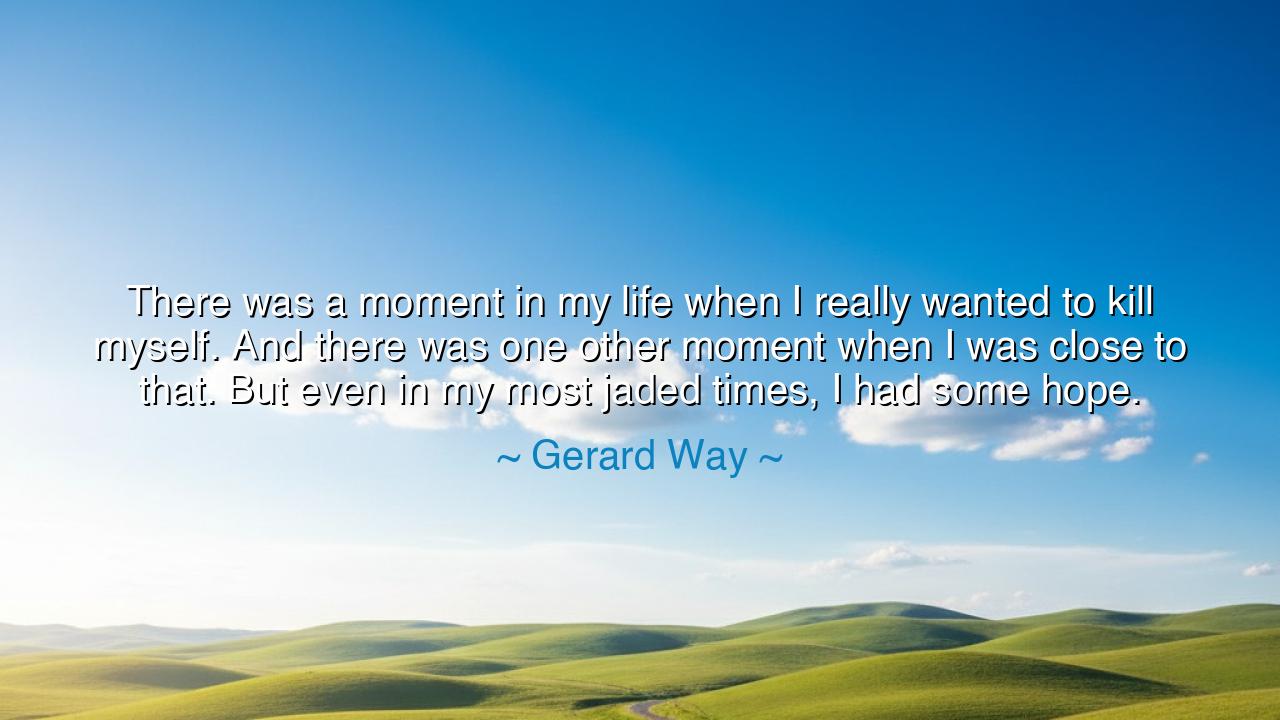
There was a moment in my life when I really wanted to kill
There was a moment in my life when I really wanted to kill myself. And there was one other moment when I was close to that. But even in my most jaded times, I had some hope.






The words of Gerard Way, “There was a moment in my life when I really wanted to kill myself. And there was one other moment when I was close to that. But even in my most jaded times, I had some hope,” are the cry of a soul that has walked through darkness and returned bearing light. They are not the confession of weakness, but the testimony of one who has stood face-to-face with despair and refused its final embrace. In this quote lies a truth as old as humanity itself — that even in the deepest pit, hope endures. Hope, that fragile yet immortal spark, has saved countless lives when all else has failed. It is the final voice that whispers, “Stay,” when the mind screams, “End it.”
Gerard Way, the frontman of My Chemical Romance, spoke these words not as an idol, but as a man. Behind the noise of fame, behind the stage lights, he faced the same emptiness that countless others have felt in silence. His words are both raw and redemptive — a reminder that to be human is to suffer, but also that within every suffering heart lies the capacity to rise again. “Even in my most jaded times,” he said — meaning even when the world seemed hollow, even when life had lost all color — “I had some hope.” That “some” is everything. It is the ember that outlasts the storm, the seed that survives winter to bloom in spring.
To the ancients, this truth would have been sacred. The philosophers of old taught that despair is the shadow of consciousness, for only those who think deeply can feel deeply. But they also taught that the way through despair is not denial, but endurance. The Stoics would say: hold fast, even when the meaning of life escapes you, for meaning returns to those who remain alive to seek it. Gerard Way’s confession echoes this timeless wisdom — that hope does not erase pain; it transforms it. It turns survival into defiance and despair into testimony.
Consider the story of Abraham Lincoln, who too wrestled with the darkness of the soul. Throughout his life, Lincoln endured waves of depression so heavy that friends feared for his life. He once wrote, “I am the most miserable man living. If what I feel were equally distributed to the whole human family, there would not be one cheerful face on earth.” Yet Lincoln endured. He held on, not through joy, but through hope — the belief that his pain might serve some greater good. In time, it did. His sorrow carved in him a depth of compassion and patience that helped heal a divided nation. Like Gerard Way, he lived to prove that hope, though small, is stronger than despair itself.
What both men teach us is this: hope is not the absence of despair; it is its answer. It is not the blinding light that banishes darkness, but the steady candle that burns within it. When one stands on the edge, weary and numb, it is not joy that saves them — it is hope, faint yet unbroken. Hope is not optimism, which depends on circumstance; it is faith in the unseen, a trust that tomorrow might bring what today cannot. The ancients would have called it the breath of the divine within the mortal heart — the proof that even when man loses sight of God, God does not lose sight of man.
And yet, there is something heroic in admitting such pain. For the world often teaches us to hide our wounds, to smile when breaking, to pretend strength when our souls are bleeding. But Gerard Way’s words remind us that vulnerability is a form of courage. To say, “I wanted to die, but I still hoped,” is to speak the language of survival. It tells every wounded heart that they are not alone — that despair is part of the human journey, not its end. The ancients revered those who walked through suffering and returned bearing wisdom; Way stands among them as a modern witness to that eternal pilgrimage from darkness to dawn.
So, my listener, take this lesson to heart: when the night closes in, cling to even the smallest spark of hope. Do not measure your strength by how happy you feel, but by how fiercely you continue to breathe. Speak your pain, for silence is the ally of despair. Seek those who can listen, for shared sorrow becomes bearable sorrow. And if you cannot yet see the light, remember — you are not required to see it, only to believe that it still exists.
For as Gerard Way teaches, hope need not be mighty to save; it need only be present. One flicker can outlast the darkness of a thousand nights. So keep it — cradle it, protect it, feed it with small acts of courage. And one day, when the dawn returns — as it always does — you will look back and understand: it was not strength, nor happiness, that saved you. It was hope. Always hope.






AAdministratorAdministrator
Welcome, honored guests. Please leave a comment, we will respond soon